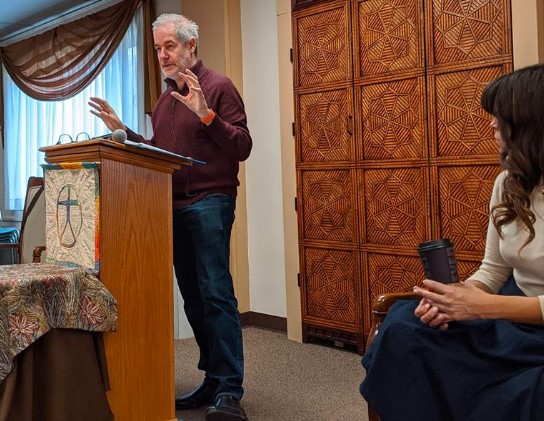
We’ve been running a series of Platform talks this season on the general topic of anti-intellectualism in America. Gregory Zucker spoke on Sep. 29 on the topic, “The Populist Attack on Democracy and Science”, Michael Thompson spoke on Oct 20 on the topic, “What Is Democracy and How Can We Reclaim It?”, and this past Sunday, Nov. 17, Massimo Pigliucci gave a provocative address entitled, “Should We Trust The Experts?” Pigliucci was a biology professor at City University of New York who changed careers and became a philosophy professor at the same institution with a special emphasis on the philosophy of science.
Pigliucci opened by quoting Arthur C. Clarke’s Fourth Law, “For every expert, there is an equal and opposite expert”. For any given subject, unless we are an expert ourselves (or an expert in expertise itself!), we have to figure out who to who believe, which experts we can trust and which should be ignored. This is not an easy thing to do and we are reminded of that fact in headlines almost every day about climate change, vaccinations, evolution, etc. Tellingly, a century ago, many of the leading experts in education, medicine and biology supported the “science” of eugenics and of phrenology, fields now thoroughly debunked.
Pigliucci proposed five steps we can take to get a handle on this vexing problem:
- Examine the arguments yourself. This is self-evident but unless you are an expert already it may not help much.
- Look for consensus with other experts. Though not perfect (see eugenics), this is a powerful proposition since it gives us insight into whether the issue is settled (vaccines are good) or not (eggs are bad for you).
- Look for independent evidence that the expert is an expert. Do others in the profession cite the person as an expert? Is the person recognized by peers as an expert (e.g., membership in the National Academy of Sciences).
- Investigate possible biases that the expert may have. This seems obvious and uncontroversial but it may not be reliable or even possible, for example, in medical research, it is often the case that the only funding available for drug research is grants by pharmaceutical companies themselves.
- Look into the track records of the supposed expert. This is another recommendation that may seem obvious and without controversy but may not be possible. Sometimes there isn’t enough data to evaluate a track record such as in the case of new areas of knowledge. There is an old joke about economics that only about half of what economists believe is actually correct but the problem is, nobody knows which half!
Pigliucci ended by noting two other things. First, even on topics that were once considered settled, such as the above-mentioned eugenics and phrenology, it was the work of experts in the field who eventually debunked them. Secondly, some topics have a moral dimension that may override simple factual considerations.
Or course, none of this is perfect and there will always be subjects where it is impossible to know who to believe or experts turn out to be wrong. In such cases, we just have to do the best we can.


